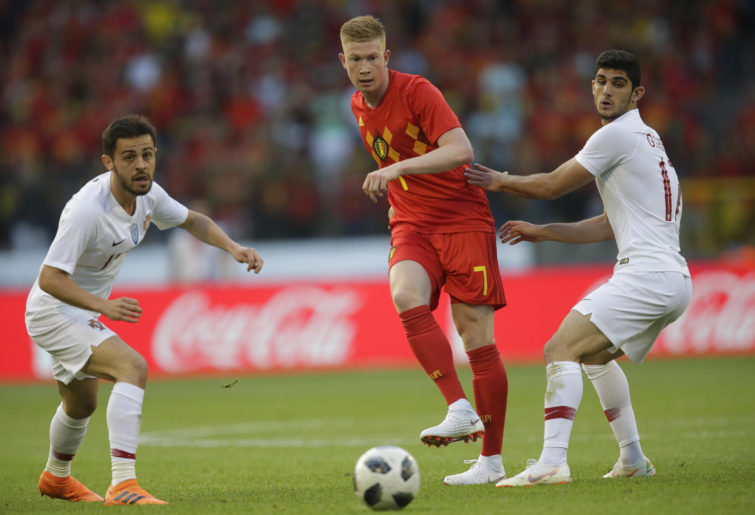WATCH: Manchester City can't believe their luck after missing first-half sitter of a tap-in
Not only did Erling Haaland's header hit the bar, but Bernardo Silva missed the rebound tap-in that came off his knee. Manchester City went…
Opinion
Belgium’s “Golden Generation” are like the Tottenham Hotspur of 2014-2019 – the ‘Nearly’ Men.
The common view seems to be one of underachievement.
Now, perhaps they have underachieved, but I’d argue – objectively – that they’ve ultimately performed at the level most people would’ve expected them to.
Did anyone really believe that, going into the 2014 and 2018 World Cups, or the 2016 and 2020 Euros, Belgium would be outright favourites? That it was their tournament to lose?
I don’t think so.
In looking at their performances across the last four major tournaments, face value would suggest mediocre results for a squad possessing the likes of Kevin de Bruyne and Eden Hazard, although the latter has had a hard time of late at club level.
Three quarter-final exits and one semi-final exit (WC 2018). However, in looking at who beat them, we see a somewhat different picture.
Can falling to the likes of 2014’s Messi-led Argentina, the unstoppable Le Bleus of 2018 or Mancini’s Euro 2020 Italian finalists really be considered a failure?
Such a claim would be at best, harsh, and at worst, a gross overestimation of the true talent this group of players possess.

(Photo by Peter Lous/Soccrates/Getty Images)
The 2016 exit to Wales was, of course, a very disappointing result, but pales in comparison to the likes of the Netherlands and Italy missing the 2018 World Cup all together, Brazil’s 7-1 home-soil thumping by the Germans, or then-world champions Spain’s 2014 group stage exit.
Let’s not forget that despite the household names of De Bruyne, Hazard and Romelu Lukaku, Belgium have also been made to utilise a number of solid, yet far from spectacular players.
In 2014, Divock Origi was no Gonzalo Higuaín, and Mousa Dembele is no N’Golo Kanté, while Thomas Vermaelen epitomises the phrase, “on his last legs”.
So why is it then, that so many people label Belgium a disappointment, that failed on the biggest stage? Maybe it was media hype, or simply the excitement of a ‘new’ nation that haven’t had great success before, competing for football’s top prizes.
A “Golden Generation” is defined as being a team that “reach or are expected to reach a level of success beyond that which their team had previously achieved”.
The reality is – Belgium did just that.
Admittedly, they did place second in Euro 1980, so technically this isn’t their very best result, however they’ve never had such a consistently sustained run of strong performances. This is also evident in being ranked No.1 in the FIFA World Rankings.
Losing to a team that go on to win, or make the final of a major tournament, is not anything to be ashamed of.
Furthermore, Belgium did actually give Argentina (2014 WC quarter-final), France (2018 WC semi-final) and Italy (Euro 2020 quarter-final) a very strong showing, in the end losing just 1-0, 1-0 and 2-1 respectively.
If not for the disastrous loss to Wales, it would have been interesting to see how Belgium matched up against Portugal in the Euro 2016 semi-final, after they had met just months earlier in what was a tight 2-1 win for the Portuguese.
Looking forward, it’s difficult to see Belgium seriously challenging for the 2022 World Cup in Qatar – though, of course, anything is possible.
With an ageing defence, and both Kevin de Bruyne and Eden Hazard heading towards the twilight of their careers, it would appear 2018’s third place World Cup finish will mark the peak of the Belgium “Golden Generation”.
A title no nation, or team, truly desires, but nonetheless one that highlights what has been a great era of success for the nation.
The greatest they’ve had.
Overall, Belgium have been unlucky in that they’ve typically come up against the ‘good’ teams early on in tournaments – distorting their degree of success.
Thus, in judging the ultimate success of their “Golden Generation” – or any nation’s, for that matter – it is crucial we take a closer look at the nation that ultimately knocks them out of various tournaments.
In doing so, we see a team that did not, by any stretch, underachieve.
Rather, they just weren’t quite good enough.